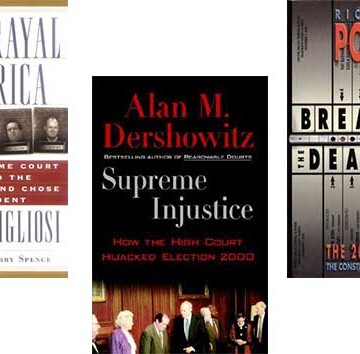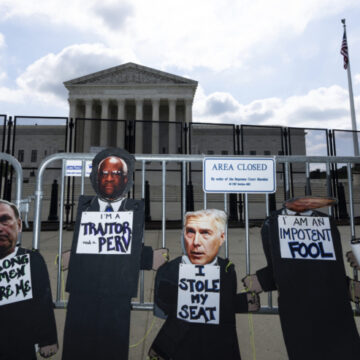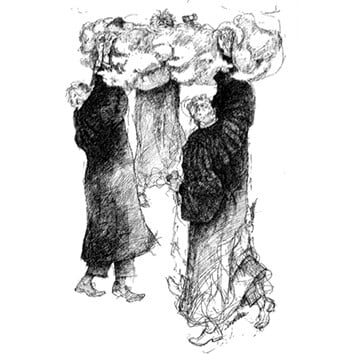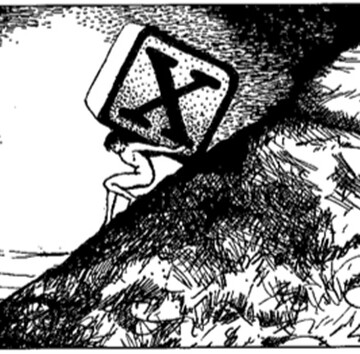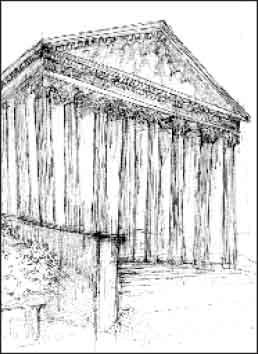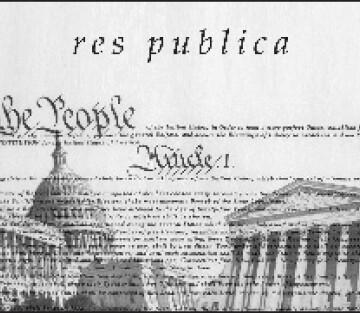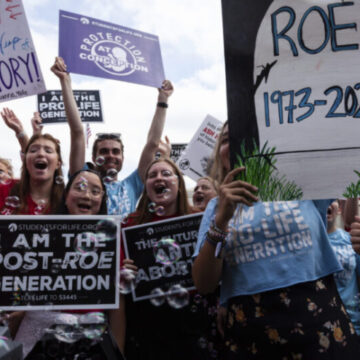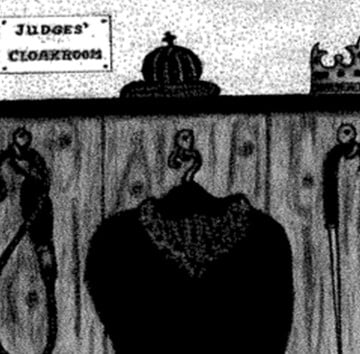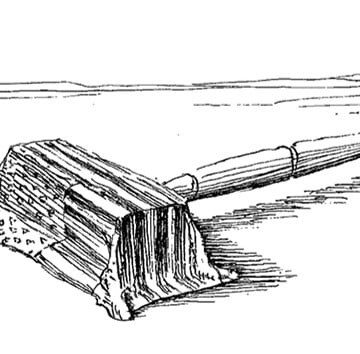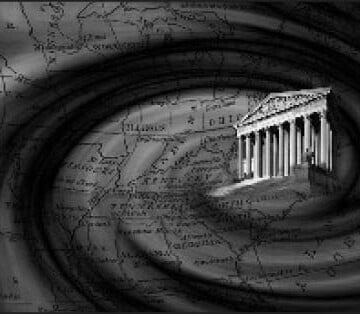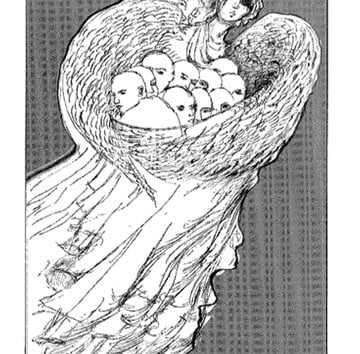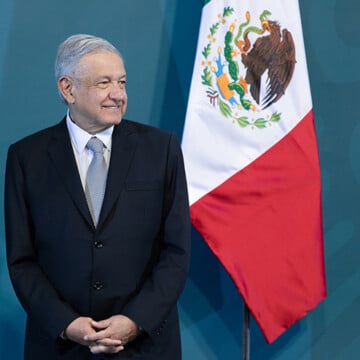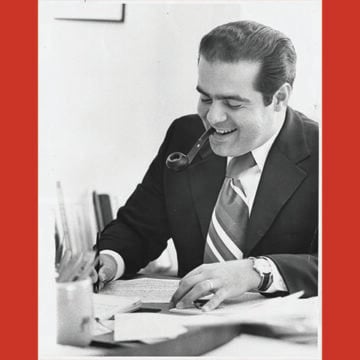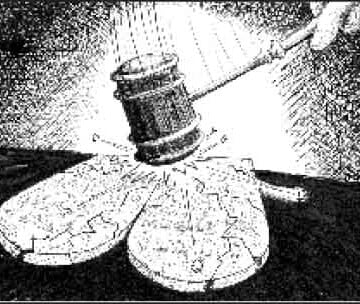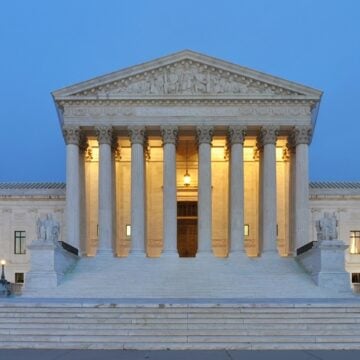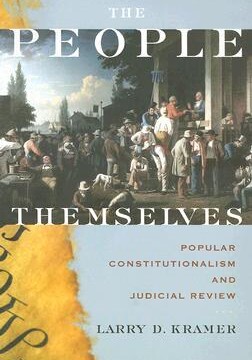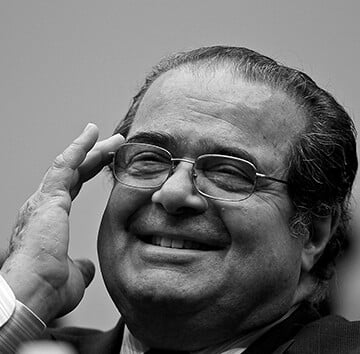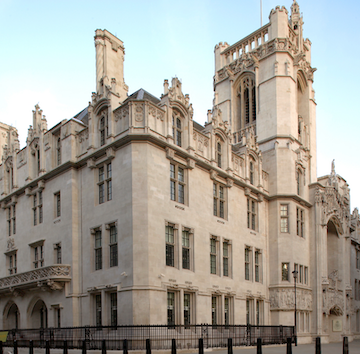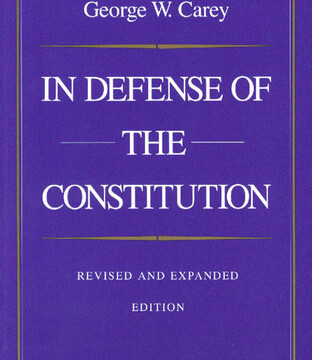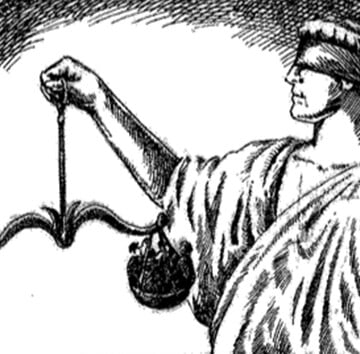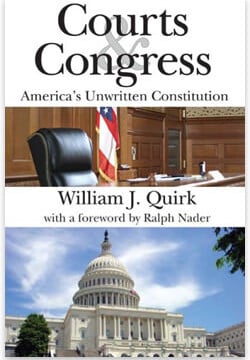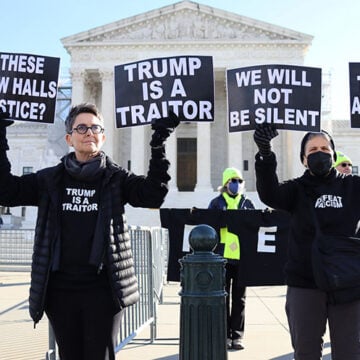“Justice is a contract of expediency, entered upon to prevent men harming or being harmed.“ —Epicurus, Aphorisms According to leading members of the American law professoriate, the U.S. Supreme Court’s decision, on December 12, 2000, in Bush v. Gore was “lawless and unprecedented,” “not worthy of ‘respect,'” featured “sickening hypocrisy and...
2065 search results for: Supreme%2525252525252525252525252525252525252525252525252525252BCourt
H.R. 3313 and the Imperial Judiciary
On July 19, three days before H.R. 3313 was debated, the ACLU issued notice of an “Urgent Briefing” entitled: “How the Marriage Protection Act (H.R. 3313) Will Harm Civil Rights, and Violate the U.S. Constitution.” The flyer explained: “The bill would shut the federal courthouse doors—including the door to the Supreme Court—to an entire group...
The Fourth Choice: Ending the Reign of Activist Judges
If you are looking for a reason to vote for Ralph Nader, the way both parties are handling the “gay marriage” issue should give you lots of data. John Kerry, when asked his opinion of “gay marriage,” looks like a dog getting a bath, as Chris Hitchens puts it. Kerry says he personally opposes “gay...
The Fourth Choice
If you are looking for a reason to vote for Ralph Nader, the way both parties are handling the “gay marriage” issue should give you lots of data. John Kerry, when asked his opinion of “gay marriage,” looks like a dog getting a bath, as Chris Hitchens puts it. Kerry says he personally opposes “gay...
The Court Versus the Hydra Left
After Dobbs, the many-headed ruling class is licking its wounds … and itching for a rematch. The upcoming midterm election will measure the resistance to the Court's attempt to return to America's constitutional origins.
The Twilight Zone
The U.S. Supreme Court has put an end to five weeks of uncertainty. In the early days of December, in the twilight between the certification of George W. Bush as the winner of Florida’s electoral votes and the decision of the U.S. Supreme Court that the Florida Supreme Court was wrong to intervene, only one...
The (Politically) Supreme Court
The great sound and fury over the nomination of Robert Bork to the U.S. Supreme Court included many grand proclamations from all sides concerning the original intentions of the constitutionalists and the relevance of those intentions to our society today. It is clear to anyone with a modicum of knowledge about the great issues involved...
Why Is the Supreme Court So Slow?
Why does it take so long to get a decision from the Supreme Court on the constitutionality of President Obama’s healthcare law, or Arizona’s SB 170, or California’s Proposition 8 limiting “gay marriage”? Currently, those three cases are meandering their way around the lower federal courts. The Obama administration’s healthcare law is under attack by...
Sisyphus and States’ Rights
Can a ten-year-old girl successfully sue a local school board for failing to prevent the sexual harassment of the young lady by an elementary-school classmate? Should an Alabama state court judge be able to display his hand-carved copy of the Ten Commandments in his courtroom? Can the people of a state decide that no state...
No Duty to Retreat American Self-Defense
One of the most significant but little noted transitions from English to American society was in the Common Law of homicide and self-defense. As far back as the 13th century, English Common Law dealt harshly with the act of homicide. The “right to kill in self-defense was slowly established, and is a doctrine of modern...
President Bush Can End “Gay Marriage” If He Wants To
In June 2003, the U.S. Supreme Court ignited our most recent culture war when it discovered a constitutional right to sodomize (Lawrence and Garner v. Texas). The Massachusetts Supreme Court then threw kerosene on the fire by finding that its constitution mandated “gay marriage” (Goodridge v. Department of Public Health). Americans from San Francisco to...
Marriage and the Law
The Massachusetts Supreme Judicial Court’s 4-3 ruling, in Goodridge v. Department of Public Health, that the Massachusetts constitution—if not the federal Constitution—requires the state to allow same-sex marriages has thrown nearly everyone into a good old-fashioned tizzy. The Massachusetts court somehow discovered that it was “arbitrary” and “capricious” and therefore legally impermissible to limit the...
Judging for the People
For just about the last half-century, since Earl Warren became chief justice of the U.S. Supreme Court, the American legal academy has pondered something usually referred to as the “legitimacy problem.” Law-school professors have believed that there is a difficulty inherent in the fact that an unelected, isolated body of nine jurists working in a...
Losing Federalism
Human liberty has two distinguishable but inseparable dimensions: the liberty of the individual to act according to his own reason and the corporate liberty of a moral community to pursue a vision of the good lived out in institutions and traditions that bind generations. These two dimensions are necessarily in tension. The individual’s autonomy can...
Overturn!
The overruling of Roe is the greatest triumph to date of the conservative legal movement. The Court had no business inventing a constitutional right to abortion.
Judicial Tyranny and Constitutional Change
What one man in America can decide that prisoners in South Carolina need croquet fields and backgammon tournaments and order the state to provide them? What one man can decide that Kansas City schools need Olympic-size swimming pools, a planetarium, a model United Nations wired for language translations, a temperature-controlled art gallery, and movie editing...
Supreme Court’s Drifting Days Are Done
This scrupulously objective book may be considered a gift to conservatives who have long despaired about the possibility of principled legal tenets regularly prevailing in Supreme Court opinions. For decades this long-suffering group has watched Republican Supreme Court appointees concur in various left-wing crackpot decisions that have become the law of the land. Thankfully, such...
What’s Next for the Imperial Judiciary?
“How much power Congress has to block Supreme Court consideration of the constitutionality of its laws is an open question.” This, the Washington Post said in a September 23, 2004, editorial, is “somewhat surprising.” The Post shouldn’t be so astonished, for the real surprise is that judicial supremacy—the doctrine that the Court interprets the Constitution...
Is There Hope for the Federal Courts?
In a radio address last year, President Clinton railed against congressional Republicans who were stalling on his nominees to the federal bench and had even threatened some sitting judges with impeachment. Their actions, he claimed, had endangered our tradition of judicial independence, and were an attack on the rule of law itself. The truth, of...
Suicide and States’ Rights
In early March, the Ninth Circuit Court of Appeals went exploring in the empty spaces beyond the text of the 14th Amendment and discovered a constitutionally protected right to suicide. Judge Stephen Reinhardt, writing for an 8-3 majority in Compassion in Dying v. Washington, went on to conclude that a Washington State law forbidding assisted...
Think Locally, Act Locally
The reaction to the U.S. Supreme Court’s decision last June in Kelo v. City of New London has largely been edifying. Most commentators, and even many politicians, have greeted with horror the news that local and state governments are free to take property from one private owner to give it to another, as long as...
Catholic Rome
St. Thomas Aquinas maintains that our intellect cannot grasp anything except through our senses. Recognizing this truth is essential to understanding the city of Rome and—beyond Rome—the Catholic Church, because Rome means nothing without the Church, and the Church loses her identity if is deprived of her Roman character. The Church has five characteristics: She...
Angels to Govern Us
“If men were angels,” James Madison wrote, “no government would be necessary.” Or, “if angels were to govern men, no controls on government would be necessary.” Madison believed that men are about as good as they can ever be, and since no angels are available to rule, we need checks and balances. Thomas Jefferson added...
Israel’s Judicial Reform ‘Controversy’ Is Much Ado About Nothing
If the proposed Israeli judicial reforms are passed, the State of Israel would be more democratic than it presently is, not less.
Mexico’s Supreme Court Changes Provide a Warning for America
There seems to be a new trend that when a new leftist government is elected it attempts to change or undermine its country’s court system to remove it as a barrier to consolidating power. During the U.S. election cycle, there was much talk of how an incoming Democratic administration might reshape the Supreme Court. Thus...
Gay Marriage: The Last Chance
“A Cinderella moment,” gushed a gay-rights advocate when the Supreme Court announced its two landmark decisions in June. California’s Proposition 8—an amendment to its constitution—went down (Hollingsworth v. Perry), as did the federal Defense of Marriage Act (United States v. Windsor). The New York Times saw a “huge and gratifying” victory for equal rights. The...
Scalia Gets the Biography He Deserves
James Rosen’s biography shows Justice Scalia’s greatness in bucking the prevailing liberalism of the Supreme Court.
Obama Versus the Supreme Court
The Supreme Court’s power has become virtually unchecked: Amending the Constitution to reverse an erroneous Supreme Court decision is nearly impossible, and Congress has proved too timid to use the other weapons the Constitution provides to check the Court, including its power to restrict the jurisdiction of the federal courts. As a result, the Supreme...
A 60-Year-Old Error
Since the days of Earl Warren, the U.S. Supreme Court has engaged in a lot of freewheeling jurisprudence: the decision granting Washington the power to dictate when and how police may apprehend criminal suspects; the declaration that the racial integration of America’s public schools is a matter of federal, rather than state, law; the ukase...
The Federal Courts, a Menorah, and the Ten Commandments
A recent phenomenon in the United States is that no one knows any longer to what extent the country, our states, or our municipalities can participate in the display of such traditional religious symbols as crèches, crosses, menorahs, or even the Ten Commandments. Until the last half of the 20th century, no one seemed too concerned...
The Gospel of Pluralism
“I esteem . . . Toleration to be the chief Characteristical Mark of the True Church.” —John Locke It is fitting that the most confused and confusing legal tradition in America today is First Amendment case law regarding religious liberty. It is confusing because at the Founding a young nation composed principally of strongly religious...
The Struggle for the Soul of the Supreme Court
During Joe Biden’s 2020 campaign for president, when his fortunes were at their nadir, Joe Biden promised that he would nominate the first black woman to the United States Supreme Court. He reportedly made this pledge to James Clyburn (D-S.C.), the powerful African-American congressman, in return for Clyburn’s help in securing the black vote in...
Exit to Political Oblivion
Al Gore’s exit to political oblivion has no doubt delighted many conservatives. But there is nothing for conservatives to cheer about in the U.S. Supreme Court’s decision in Bush v. Gore, the instrument of Gore’s demise. The unsigned majority opinion concluded that Florida’s recount procedures violated the Equal Protection Clause of the 14th Amendment, because...
An Appointment to the Supreme Court
It was a beautiful day in May 1979 when the Georgetown University Law School held its commencement. Honorary degrees were awarded to Justice William J. Brennan, Jr., of the U.S. Supreme Court, and Judge John A. Danaher, of the U.S. Court of Appeals for the District of Columbia. It was an hour with extraordinary coincidence...
Obama Versus the Supreme Court
The Supreme Court’s power has become virtually unchecked: Amending the Constitution to reverse an erroneous Supreme Court decision is nearly impossible, and Congress has proved too timid to use the other weapons the Constitution provides to check the Court, including its power to restrict the jurisdiction of the federal courts. As a result, the Supreme...
Who Will Judge the Judges?
Abraham Lincoln, in his 1860 Cooper Union speech, asked, “What is the frame of government under which we live?” The answer must be, he said, the Constitution of the United States. The answer today, as Chronicles’ reviewer of Quirk’s and Bridewell’s Judicial Dictatorship stated in 1995, is a judicial dictatorship imposed by the Supreme Court. ...
Our Judicial Dictatorship
Do the states have the right to outlaw same-sex marriage? Not long ago the question would have been seen as absurd. For every state regarded homosexual acts as crimes. Moreover, the laws prohibiting same-sex marriage had all been enacted democratically, by statewide referenda, like Proposition 8 in California, or by Congress or elected state legislatures....
Stand Your Ground
Bodie, July 1881—The early morning hours found deputy constables Richard O’Malley and James Monahan patrolling the streets of the mining town of more than 5,000 residents in mountains immediately east of the Sierra. Bob Watson and George Center happened by. A young miner, Center was “quiet when sober,” said the Daily Free Press, “but when...
Law and Liberty
Let’s say that a state passed a statute proscribing teachers from teaching reading in a language other than English until the student had passed the eighth grade. Violation of the statute was a misdemeanor. The state’s rationale was to assure that immigrant children learned English and assimilated. In fact, the state declared that teaching immigrant...
Supreme Court Usurpation, UK-Style
The Founding Fathers of the United States, in their Ur-wisdom, laid it down that the Supreme Court should consist of 6 Justices. Britain, in its belated imitation of the United States, created in 2009 a Supreme Court of 11. That meant in the first place jobs for the boys, and girls. There are 3 female justices,...
When Judicial Supremacists Attack
Partisan. That’s the complaint many Americans have with the state of politics. The country would be better off, we are told, if only the Republicans and Democrats could put aside petty differences and work together. Can’t the left and right find some common ground and build on it? Unfortunately, when it comes to the power...
Tackling the Judiciary
Among conservative constitutional scholars, George Carey best demonstrates the knack of remaining perpetually relevant. From his collaboration with his own mentor Willmoore Kendall in the 1960’s through his many writings on the federalist papers over three decades, some included in this volume, Carey has worked to show the value of the American founding to our...
Every Neighbor a Litigant
Goethe taught us that true happiness comes from being engaged with others in productive projects, and we have known since Plato and Aristotle that man is a social animal, but we would be hard put to reach these conclusions if our only guide were the current state of American law. Far too often the American...
Did the Supreme Court Destroy Property Rights in the Kelo Case?
In one of the most closely watched cases from the last Supreme Court term, Kelo v. New London, the U.S. Supreme Court, by a 5-to-4 majority, ruled that the city of New London could exercise its “eminent domain” power to condemn several private residences in order to raze them as part of an effort to...
Men in Black
The U.S. Supreme Court is like one of those dinosaur reconstructions at which children gape when they are taken to a museum. Not only is the Court today an imaginative reconstruction of something that no longer actually exists, it is so huge an institution that few Americans are able to take it in all at...
Strippers to the Rescue
“Courts of justice cautiously abstain from deciding more than what the immediate point submitted to their consideration requires.” —Mr. Justice Nicholl In what was probably the most laudable achievement of his administration, President George W. Bush placed on the Supreme Court two justices, Chief Justice John Roberts and Associate Justice Samuel Alito, who believe...
Recapturing the Constitution
In a landmark five-to-four decision last spring, in United States v. Lopez, the Supreme Court announced—for the first time in almost 50 years—that Congress had exceeded its interstate commerce powers. At issue was a federal statute—the Gun Free School Zones Act of 1990—which forbade the carrying of firearms within one thousand feet of a school....
The Court’s Current “Conservative” Bloc
The U.S. Supreme Court ended its October 1998 term on June 23, the earliest closing date in 30 years. Anthony Lewis, writing in the New York Times, declared that the term “showed us a phenomenon that this country has not seen for more than 60 years: a band of radical judicial activists determined to impose...
Maybe It’s Not Time to Head for the Hills
In the wake of the Supreme Court’s decision in Obergefell recognizing a non-existent right to gay marriage in the Constitution, there have been numerous articles stating that America has accepted gay marriage and that social conservatives should now shut up. A variation of this theme has been taken up by certain social conservatives such as...
SCOTUS’s Unanimous Decision and the Pandemic of Trump Derangement Syndrome
That things could get ugly and fast explains why it was imperative for the Supreme Court to rule as it did in the Colorado ballot case—and to do so unanimously.
